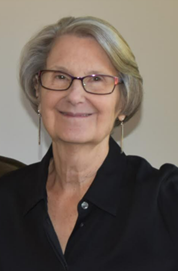
Touching, Eating & Bodily Fluids
Affirming & Restoring Meaning When Working with
Primitive Mental States
When: Saturday, December 4, 2021
9:00 – 12:00 PM
Where: Zoom - You will receive Zoom link upon paid registration.
Cost: Non-members: $35
Members: $25
New professionals (within 3 years): $15 - honor system
Students: $10
3 CEU's will be offered upon successful completion of the course evaluation (to be sent after the course)
What do we mean by primitive mental states? How do we recognize them in ourselves and in our patients? How do we organize and engage with experiences that bring us to the edge of language or threaten to annihilate both ourselves and our patients?
Experiences with patient B do not definitively answer these questions, but suggest the importance of these abilities: to vacillate between a Bionian-like reverie and a Winnicottian playfulness, to be the Alpha function, and to be the good, bad, or no object; but equally important, to take risks, to be willing to feel ridiculous and incompetent, and to affirm the reality and meaning of human need and relationship while staring into the abyss of horror and insanity (both inside ourselves and our patients).
A quote by psychoanalyst Shelley Alhanati captures aspects of my perspective:
“These kinds of patients comprehend us through their bodies first—not their minds—and they need us to do the same. They need us to smell them and drink them and taste them and touch them and hear the music in their voices first. They need us to be drunk with their experiences to such a degree that it feels as if they are our own.”
How do we “smell them and drink them and taste them” without violating boundaries? Is this literal or symbolic? Once we meet patients in this way, what then? I would like to share several moments in my work with patient B that illuminate different ways of defining, thinking about, and working with primitive mental states, ranging from mentalizing work and interpretation, to knowing and communicating through the body while affirming the meaning of human life and relationship.
OBJECTIVES
1. Identify three ways of conceptualizing ‘primitive mental states.’
2. Identify the importance of being flexible with theory and approach when working with primitive mental states.
3. Identify the significance of the body when working with primitive mental states.
PRESENTER
Ingrid Tucci, LPCC
Tucci started her career in a methadone clinic, treating opiate dependent individuals struggling with severe trauma histories. Blood, urine, nudity, and decomposing body parts were part of this work, occurring in a treatment frame that stretched between office, bathroom, parking lot, and hallway. The permeable body, along with the elasticity of space and time, all conveyed the primitive and disorienting nature of severe and early trauma. It was in this space that she began to develop a therapeutic self, discover a desire to connect with these states of mind/being; to see if they could find a way through the darkness together. It was there that she first met patients with dissociative identity disorder and came face to face with her own ignorance.
Tucci has a background in philosophy and theology, but is an atheist. She is a mother of two children, ages 10 and 6, who are constantly teaching her about being human.

DISCUSSANT
Kathleen Fargione, LICSW
Fargione is retired from clinical practice, but continues to teach and write. In her years as a psychoanalytic psychotherapist, she saw many abused, traumatized, borderline and autistic children and adults whose minds had been halted in their developmental trajectory. Her interest in primitive states of mind began when she worked with a profoundly withdrawn boy whose fine mind was trapped in a sensory nightmare. It was the work of Frances Tustin and Anne Alvarez and Judith Mitrani, among others, who helped her through the mine field of working with this young man. Her paper “Climbing a Waterfall: Understanding an Adolescent Boy in Autistic Retreat” was published in the British Journal of Child Psychotherapy in 2013. Her work with a traumatized, dissociated young woman was published as a chapter in the book Reflections on Long-Term Relational Psychotherapy and Psychoanalysis in 2019.
Kathleen has taught “Evolving Psychoanalytic Concepts” at two psychoanalytic institutes for the past five years. Developing this class has deepened her understanding of the rich history of psychoanalytic ideas from Freud and Klein through Winnicott and Bowlby to neuroscience and Bion. She remains deeply interested in ideas about early mental development and how it can be derailed by trauma, especially as seen in the work of Judy Eekhoff and Ofra Eshel and Jeff Eaton.

If you have any questions, please reach out to Heidi Holste, Executive Director at admin@mpsi.info.
We appreciate your involvement with MPSI.
